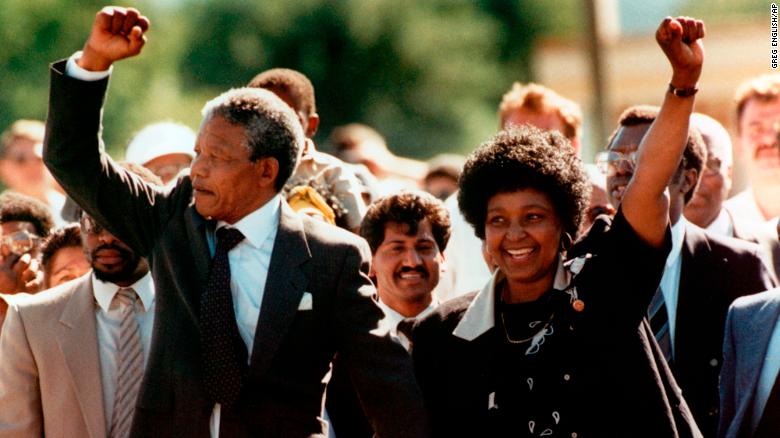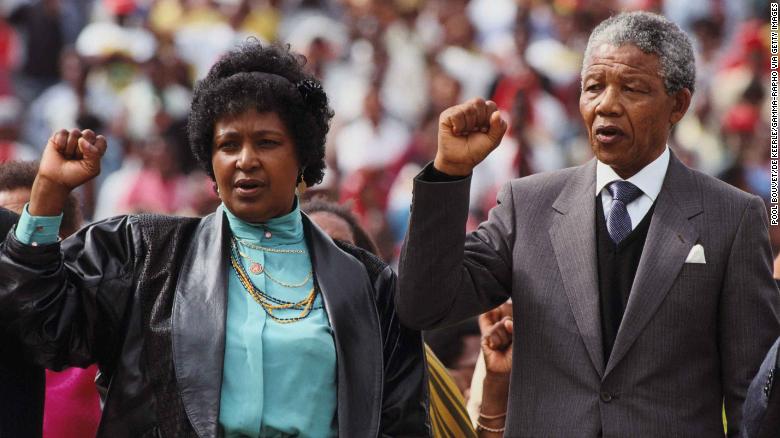Winnie
Madikizela-Mandela, the South African anti-apartheid campaigner and
former wife of the late President Nelson Mandela, has died at age 81.
The
family said in a statement that she passed away at the Netcare Milpark
Hospital in Johannesburg, South Africa after a long illness, for which
she had been in and out of hospital since the start of the year.
"Mrs.
Madikizela-Mandela was one of the greatest icons of the struggle
against apartheid," the statement said. "She fought valiantly against
the apartheid state and sacrificed her life for the freedom of the
country."
Her death came as a shock. "None of us had predicted this," a family spokesman told CNN.
Madikizela-Mandela was known as the "Mother of the Nation" because of her struggle against white-minority rule in South Africa.
She was married to Nelson Mandela for 38 years, including the 27 years he was imprisoned on an island near Cape Town.
"She
kept the memory of her imprisoned husband Nelson Mandela alive during
his years on Robben Island and helped give the struggle for justice in
South Africa one of its most recognizable faces," the statement said.
The
couple were divorced in 1996, two years after Nelson Mandela became
South Africa's first black President. They had two daughters together.
Nelson Mandela died in 2013.
A
longtime stalwart of the ruling African National Congress, or ANC,
political party, Madikizela-Mandela was a member of South Africa's
parliament at the time of her death.
One of the last official visits she received was from current South African President Cyril Ramaphosa, who went with her to Soweto township last month to encourage people to register to vote in next year's presidential election.
On
Monday, Ramaphosa praised Madikizela-Mandela as "an advocate for the
dispossessed and the marginalized" and "a voice for the voiceless."
"Even
at the darkest moments of our struggle for liberation, Mam' Winnie was
an abiding symbol of the desire of our people to be free," Ramaphosa
said in a statement. "In the midst of repression, she was a voice of
defiance and resistance. In the face of exploitation, she was a champion
of justice and equality."
A memorial service for Mandela will be held April 11 and an "official national" funeral will be April 14, Ramaphosa said.
Born in 1936 in what is now known as the
Eastern Cape province, Nomzamo Winifred Madikizela was the daughter of a
history teacher.
As a young
social worker, she married Nelson Mandela in 1958 at age 22, and stood
by him in the years following his 1964 conviction and life imprisonment
sentence for sabotage and conspiracy to overthrow the government.
Madikizela-Mandela led an international campaign calling for his release.
While
Nelson Mandela was banned from reading newspapers, his wife was his
link to the outside world. Madikizela-Mandela told him of the changes
taking place in his homeland and became his often outspoken and
controversial public voice.
Nelson
Mandela was finally freed in 1990. His defiance of white-minority rule
and his long incarceration for fighting against state-sanctioned
segregation focused world attention on South Africa's apartheid system,
making him the symbol of the struggle to end the practice and bring
racial equality to his country.
Outside
Africa, Madikizela-Mandela was known largely because of her ex-husband,
but in South Africa she was the mouthpiece and face of the bitter
struggle against the racist regime.
"She
refused to be bowed by the imprisonment of her husband, the perpetual
harassment of her family by security forces, detentions, bannings and
banishment," said Archbishop Desmond Tutu in a statement. "Her
courageous defiance was deeply inspirational to me, and to generations
of activists."
A controversial legacy
Although
Madikizela-Mandela, who suffered from diabetes, helped usher in a new,
more equitable South African political system during her lifetime, she
was also entangled in a number of scandals over the years.
In
December 1988, her bodyguards, known as the Mandela United Football
Club, kidnapped four boys belonging to another anti-apartheid party. One
of them, Stompie Moeketsi, was murdered a few days later.
In
May 1991 she was sentenced to six years in prison for kidnapping in
relation to the incident, but the sentence was later reduced to a fine.
Madikizela-Mandela
bounced back and in 1993 was elected president of the ANC's women's
league. In 1994, when her then-husband became President, she was elected
to parliament and became deputy arts and science minister in the
country's first multi-racial government.
Ever
the feisty campaigner, Madikizela-Mandela continued to provoke
controversy with her attacks on the government and her strident appeals
to radical young black followers.
She was expelled from her husband's cabinet a year later.
Madikizela-Mandela
was re-elected for a second parliamentary term in 1999 but resigned
four years later after she was convicted of fraudulently taking out bank
loans and theft -- the loans were used to help poor people.
Her conviction for theft was overturned a year later because she had not recognized any personal gain from her actions.
South Africa's Truth and Reconciliation Commission also accused her of human rights abuses during the apartheid years.
Something
of a firebrand, she continued to clash with successive ANC presidents
in and out of parliament for the rest of her life.







No comments:
Post a Comment